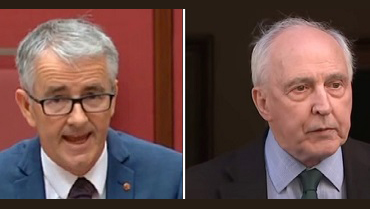The Australian Alert Service is the weekly publication of the Australian Citizens Party.
It will keep you updated on strategic events both in Australia, and worldwide, as well as the organising activities of the Citizens Party.
To subscribe to the Australian Alert Service, it's easy, and it's secure.
Click here for subscriptions within Australia
Click here for overseas subscriptions
Lead Editorial
2 September 2020
Vol. 22. No. 35
Over the last four decades both major Australian political parties have converged on a neoliberal, market-obsessed ideology for policy making. This neoliberal consensus transformed Australia from a manufacturing powerhouse at the end of World War II, to a service-sector economy, with banking and financial services at the forefront.
Leaders who diverge from that consensus are usually shuffled off into obscurity. Those who manage to survive to offer a solution when it becomes clear those policies have failed, are smashed by establishment political forces, as most clearly demonstrated with British MP Jeremy Corbyn. But more MPs are now ranging outside of the usual right-left divide and finding the courage to defy it. This process will become unstoppable as the crisis worsens.
Now a Liberal Senator has launched a huge broadside at the Hawke-Keating Labor Party’s neoliberal policies, which is also a blast at the same ideology in his own party. Queensland Senator Gerard Rennick wrote an open letter to former Prime Minister Paul Keating on 6 August about the push to increase compulsory superannuation payments. Rennick attacked the mindset which encouraged “overpaid fund managers” and deprived the economy of funds that could have built infrastructure and manufacturing industry, as super drained money from local regions into fund managers in Sydney. Neoliberal policies introduced by the Hawke government have “led to the destruction of Australia’s economic sovereignty … putting unelected bureaucrats in charge of monetary policy and the sale of the Commonwealth Bank enriched innercity blowhards while leaving honest, hardworking battlers enslaved to the banks.”
He blasted decisions that banned dam building and “gave unelected foreign bodies greater power over our natural resources than our own state governments”. Noting that just $113 billion of Australia’s $3 trillion super is invested in infrastructure, but $700 billion is invested overseas, Rennick demanded that “Existing super funds should be encouraged to invest in much-needed infrastructure that will benefit the Australian people.”
Keating sold superannuation to the unions and Australian public as a way to ensure dignified retirements for working people, so they wouldn’t have to rely on the pension. In the 1990 election campaign, Bob Hawke promised it would be invested in Australian industry and we wouldn’t need to borrow from overseas. The unions swallowed these promises hook, line and sinker, but despite the rhetoric, it was neoliberalism in welfare’s clothing. Super hasn’t been invested in Australia; it hasn’t stopped us borrowing from overseas; and it largely hasn’t secured dignified retirements (especially for women), as it isn’t guaranteed but ties the fate of retirees to stock market fluctuations.
Super has been a boon to financial managers and banks, however, none more so than Macquarie Bank, a.k.a. the millionaire factory, which built a global business of lining up investors to buy privatised infrastructure all over the world, based on a model that allows Macquarie to collect huge fees but get the sucker investors to take all the risks. In his book Unfinished Business: Paul Keating’s interrupted revolution, Keating fan David Love revealed the suckers would be retirees: “Paul Keating’s superannuation reforms … would feed the Macquarie machine with the investment funds it needed to grow and prosper.”
Senator Rennick countered: “It would be much better to just pay a higher pension and re-train white-collar paper shufflers to build infrastructure along with rebuilding our manufacturing industry....”
That a Liberal politician is denouncing neoliberalism this way shows the fortress is crashing down. With the Reserve Bank set to increase its support for the banks to $200 billion, supposedly to help the nation out of the downturn, but with nothing to ensure it helps the thousands of small business heading for collapse in the real economy, it will only crash faster. Expect more political leaders to join Rennick, Bob Katter, Malcolm Roberts, and Greens Senator Peter Whish-Wilson in supporting a foreclosure moratorium and a national bank to rebuild the real economy (p. 3).
In this issue:
- To avert a crushing economic depression, restructure the debt!
- Parliament is democratically elected, but the Crown holds the reins
- Chifley to Menzies: the fascists served the bankers
- Canberra unveils next phase of New Cold War vs China
- Australian MPs push CANZUK British Empire reboot
- ‘Global Britain’ and gunboats
- Jackson Hole: full speed ahead with bank bailouts
- Nutty rumour, or true?
- Bushfire inquiry report downplays fuel loads
Click here for the archive of previous issues of the Australian Alert Service








